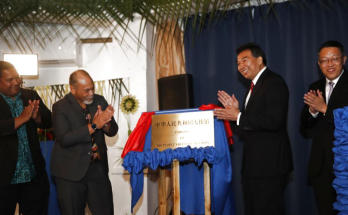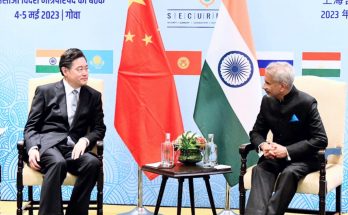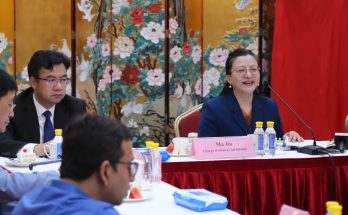 “If I say Amir Khusrau is our poet, I would be stoned in India,” the Tajik ambassador said recently in New Delhi, a shade dramatically. In Dushanbe, don’t be surprised if Tajiks recite to you soulful couplets of Zebn-un-Nisa, Aurangzeb’s eldest daughter better known by her pen-name Makhfi (The Hidden One). Mahabharata and Ramayana are prime time shows on Uzbek TV. And this will be a revelation for those not in the know: on Valentine’s Day, Uzbeks celebrate their love for the 16th century Mughal emperor Babur.
“If I say Amir Khusrau is our poet, I would be stoned in India,” the Tajik ambassador said recently in New Delhi, a shade dramatically. In Dushanbe, don’t be surprised if Tajiks recite to you soulful couplets of Zebn-un-Nisa, Aurangzeb’s eldest daughter better known by her pen-name Makhfi (The Hidden One). Mahabharata and Ramayana are prime time shows on Uzbek TV. And this will be a revelation for those not in the know: on Valentine’s Day, Uzbeks celebrate their love for the 16th century Mughal emperor Babur.
Culture and Geopolitics
From Bollywood and kathak to yoga and Hindi, Central Asia is suffused with the glow of Indian culture and spirituality. It was, therefore, fitting when India launched its Connect Central Asia policy in 2012 as the two regions have been conjoined intimately through historical and cultural ties for centuries. It’s a relationship that has been enriched by culture and poetry, but geopolitically it’s only now this strategically located region is zooming back into the focus of India’s diplomatic-strategic establishment.
Why Central Asia
 Prime Minister Narendra Modi’s visit to the five Central Asian states is a compelling statement of India’s reawakened interest in the region that is critical to the country’s interlinked strategic, economic and energy interests. The forthcoming visit of Mr Modi, the first by an Indian prime minister to all five post-Soviet Stans states in one go, is a game-changer of sorts that’s set to transform India’s multifarious relations with the energy-rich Central Asian region, where China has firmly positioned itself as the leading economic power and dispenser of largesse. The fact that the visit to CAS is coupled with the participation of the Indian prime minister at the SCO summit acts as a force multiplier for New Delhi’s relations with a hitherto neglected region. India’s expected elevation from an observer to a full member in the SCO is deeply symbolic as it signals that New Delhi is not content with being an observer as other regional powers – read China and Russia – play their games in the region.
Prime Minister Narendra Modi’s visit to the five Central Asian states is a compelling statement of India’s reawakened interest in the region that is critical to the country’s interlinked strategic, economic and energy interests. The forthcoming visit of Mr Modi, the first by an Indian prime minister to all five post-Soviet Stans states in one go, is a game-changer of sorts that’s set to transform India’s multifarious relations with the energy-rich Central Asian region, where China has firmly positioned itself as the leading economic power and dispenser of largesse. The fact that the visit to CAS is coupled with the participation of the Indian prime minister at the SCO summit acts as a force multiplier for New Delhi’s relations with a hitherto neglected region. India’s expected elevation from an observer to a full member in the SCO is deeply symbolic as it signals that New Delhi is not content with being an observer as other regional powers – read China and Russia – play their games in the region.
SCO: What’s in it for India?
For India, getting inside the SCO tent is not simply about getting into another hitherto closed regional club. There are all-too-real stakes for New Delhi as the SCO and the Stans states have a pivotal role in shaping the unfolding transition in Afghanistan. India has been pushing for a broad-based regional approach for stabilising Afghanistan, and the SCO-driven regional approach could be an influential forum for this purpose.
RATS and Monsters
 Another factor that should strengthen India’s association with the SCO is an across-the-board consensus to jointly combat the trinity of evils, including terrorism, extremism and separatism. In this area, solidarity is real as there is a sense of shared victimhood – each country in the region has a history of being targeted by militant groups professing pan-Islamist ideology. India will, therefore, be looking to leverage the SCO’s RATS (Regional Anti-Terrorism Structure) to bolster regional efforts to quash the common enemy.
Another factor that should strengthen India’s association with the SCO is an across-the-board consensus to jointly combat the trinity of evils, including terrorism, extremism and separatism. In this area, solidarity is real as there is a sense of shared victimhood – each country in the region has a history of being targeted by militant groups professing pan-Islamist ideology. India will, therefore, be looking to leverage the SCO’s RATS (Regional Anti-Terrorism Structure) to bolster regional efforts to quash the common enemy.
At the forthcoming Ufa summit, the spotlight will be on the emerging scourge of The Islamic State. There are reports of young men from Russia and other CAS joining the ranks of the ISIS/ISIL, and the Russian presidency of the SCO is pushing for a pan-regional approach to deal with this many-headed monster.
It’s not just counter-terrorism that should be of interest to India. Amid new geopolitical games in the region marked by the rise and rise of China and the return of the US, India as a full member of the SCO should be looking to proactively shape the evolving security architecture in the region. In this context, the Russian proposal for setting up National Military Advisors’ Office in the SCO is an idea with a lot of promise, and should be supported by New Delhi.
Narrative of Opportunity
 India’s induction into the SCO as a member and the prime minister’s visit to Stans, however, should not be viewed primarily through the security prism. The idea is to seize the day, and shape the narrative of opportunity in Central Asia. Prime Minister Modi, therefore, is expected to push for India’s inclusion into the SCO’s Energy Club and strike energy deals with each Central Asian nation. While Kazakhstan, Uzbekistan and Turkmenistan are rich in hydrocarbons, Kyrgyzstan and Tajikistan are sitting on massive reserves of hydropower. In Kazakhstan, Prime Minister Modi is expected to witness the first drilling of oil in Satpayev block, which will also be symbolic of India’s desire to step up energy ties with the region. In Turkmenistan, fast-tracking the TAPI pipeline will on top of the agenda as it could become the energy lifeline for the entire region. Turkmenistan’s ambassador to India Parakhat H. Durdyev told India Writes Network that September will be an important milestone in the TAPI project as a consortium will be announced, followed by the start of construction of physical infrastructure by the end of the year.
India’s induction into the SCO as a member and the prime minister’s visit to Stans, however, should not be viewed primarily through the security prism. The idea is to seize the day, and shape the narrative of opportunity in Central Asia. Prime Minister Modi, therefore, is expected to push for India’s inclusion into the SCO’s Energy Club and strike energy deals with each Central Asian nation. While Kazakhstan, Uzbekistan and Turkmenistan are rich in hydrocarbons, Kyrgyzstan and Tajikistan are sitting on massive reserves of hydropower. In Kazakhstan, Prime Minister Modi is expected to witness the first drilling of oil in Satpayev block, which will also be symbolic of India’s desire to step up energy ties with the region. In Turkmenistan, fast-tracking the TAPI pipeline will on top of the agenda as it could become the energy lifeline for the entire region. Turkmenistan’s ambassador to India Parakhat H. Durdyev told India Writes Network that September will be an important milestone in the TAPI project as a consortium will be announced, followed by the start of construction of physical infrastructure by the end of the year.
Economically, the relations between India and Central Asia are not even the tip of the iceberg in terms of sheer potential that exists in the region. Here the comparison with China is unavoidable: India’s total bilateral trade with the region is not even $2 billion, compared to China-Central Asia trade of around $40 billion. Chinese investments in Central Asia are around $33 billion, many times more than miniscule Indian investments. Hopefully, the prime minister’s trip will ignite interests of Indian Inc, and small steps by way of investments will add to a more substantive Indian business presence in the region in the not too distant future.
Promoting connectivity will hold the key. India will, therefore, be looking to fast-tracking the International North South Transport Corridor during PM Modi’s visit. The INSTC will complement the recent agreement signed by India with Iran on building Chabhahar port.
Development Diplomacy
The incipient economic partnership should get a boost from India’s plans to enhance development cooperation with countries of the region. Here there is something to cheer about: India-assisted projects and lines of credit and grants provided for a string of developmental projects have generated enormous goodwill for India in the region. One can expect PM Modi to make new announcements regarding setting up of training institutes, IT and entrepreneurship development centres, universities and hospitals. Mr Modi has a historic opportunity to pitch India’s relations with the region onto a higher plane, and it would not be unrealistic to expect India to announce $1-2 billion in Lines of Credit for the entire region. India will also be looking to operationalise pan-Central Asia e-network that will provide telemedicine and tele-education to all five countries in the region. The e-network has worked fairly successfully in Africa, and a digitally empowered region will aid India’s efforts to spur trade and investment.
New Great Game? Stepping on the gas
On the whole, Prime Minister Modi’s maiden trip to Central Asian states is underpinned by an ambitious multi-faceted agenda and comes at the right time when a new great game is subtly unfolding in the region. With China in the ascendant, the US itching to reassert itself in the region and the Russian economy on a downward spiral, India has a rare opportunity to make up for all that lost time and establish itself as an important and benign player in the region. The late arrival of India, Asia’s third largest economy and the world’s largest democracy, onto the regional scene opens new possibilities, and emergence of new equations. Caught between the games of China, Russia and the US, Central Asian states could be possibly looking at India as a bridge-builder and balancer. Will India step on the gas? It’s for PM Modi to seize the moment, and fashion a contemporary and modern relationship with the strategic resource-rich region, without foregoing centuries-old connections of heart and mind embodied in poems of Amir Khusro and Zebn-un-Nisa.
Author Profile

- Manish Chand is Founder-CEO and Editor-in-Chief of India Writes Network (www.indiawrites.org) and India and World, a pioneering magazine focused on international affairs. He is CEO/Director of TGII Media Private Limited, an India-based media, publishing, research and consultancy company.
Latest entries
 India and the WorldMarch 3, 2024India-Denmark Connect: Red carpet for Indians to Red Sea cooperation
India and the WorldMarch 3, 2024India-Denmark Connect: Red carpet for Indians to Red Sea cooperation India and the WorldFebruary 17, 2024Munich Security Conference: Jaishankar, Blinken focus on Red Sea, Middle East
India and the WorldFebruary 17, 2024Munich Security Conference: Jaishankar, Blinken focus on Red Sea, Middle East India and the WorldFebruary 14, 2024Munich Security Conference report: Migration, war top security threats
India and the WorldFebruary 14, 2024Munich Security Conference report: Migration, war top security threats India and the WorldJanuary 23, 2024With “Ram to Rashtra” mantra, Modi consecrates Ram temple for national renewal
India and the WorldJanuary 23, 2024With “Ram to Rashtra” mantra, Modi consecrates Ram temple for national renewal







